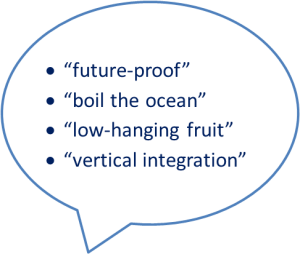By Nimroth Gwetsa, 29 October 2014.
Some Overused Business Buzzwords
Using buzzwords can be troublesome. Salespeople often use them to hoodwink potential buyers into spending money on their redundant products and services. IT professionals, marketers and consultants notoriously force jargons in business communication.
Jargon can be useful in simplifying complex topics. Sometimes explanations cause more confusion than ordinary use of words. I hope to not cause any confusion with my brief discussion on Information Management.
What is Information Management and how can it benefit IT Professionals?
I get confused trying to understand various definitions of Information Management. My confusion is like that of an identifier in the 30 SECONDS® board game, trying to guess the correct name described.
BusinessDictionary.Com defines information as “data that is (1) accurate and timely, (2) specific and organized for a purpose, (3) presented within a context that gives it meaning and relevance, and (4) can lead to an increase in understanding and decrease in uncertainty. Information is valuable because it can affect behaviour, a decision, or an outcome.” It also defines Management as “the organisation and coordination of activities of a business in order to achieve defined objectives”
I like the simplicity of the definition by The Information Management Foundation describing it as “the organized collection, storage and use of information for the benefit of an enterprise”. This simplified definition can still cause confusion. To understand the topic better, think about the usefulness of information in business. Information is about the intelligence, insights, facts and knowledge of the organisation’s “health”, opportunities and business methods among others. Management part is about the right creation, collection, receipt, storage, dissemination and specific use to benefit recipients. Its management ensures correct deployment and use of resources throughout the process.
All aspects of business result in the creation and use of such data records and facts. Information Management could be defined as structured organisation and coordination of the creation, receipt, gathering, storage, dissemination and use of specific, valuable data or facts about all aspects of the business for beneficial use by recipients. This definition is wordy, but contains words describing important actions to be accomplished on business information. In this definition, information is an asset to business. No business can be sustained without “information”. Management of information should be a deliberate and regular broad activity performed in business.
In this context, Information Management is not a single activity. Neither is it about installing a particular system. Information Management is a process involving broad activities just as Financial Management is not a single activity in business.
The definition enables us to see Information Management as a broad framework and practice through which information, as an asset, is collected, stored and used in business to achieve objectives.
Topical jargons such as Content Management, Records Management, Knowledge Management, Information Sharing, Business Product Information, Customer Information, Social and General Business Media Management, Business Information Analytics, Taxonomy Management, Information Governance and Metadata Management, among others, can be understood as specific structured efforts of encouraging the collection, storage and use of information in a defined context to achieve business objectives.
As an overarching framework and practice, Information Management presents opportunities for IT Professionals to improve their interactions and relationships with business executives. Instead of focusing only on the availability, continuity and security of information and communication systems infrastructure, IT Professionals need to be concerned also, about how such infrastructure helps business and customers use information to solve problems and pursue envisioned opportunities.
Thus the goal of an IT professional should not just be about the provision, availability and performance of ICT infrastructure and services, but also about its usage and effectiveness in solving problems for which it was made available. An understanding of the value of information starts with the concern and understanding of what data records and facts are valuable in business. The value of such records and facts is best known when it is collected, stored and used in the context of disciplines falling broadly under Information Management. Information Management is everyone’s responsibility and not just an IT Professional’s.
Because of wider use of technology, it is unthinkable for business executives to pursue advancement strategies without considering their information and communication system needs. Those needs necessitate business executives to take charge of their ICT strategy and investment. Those responsibilities extend to using technology to promote productivity and information sharing needs internally. The responsibilities also promote the sale, availability, uptake and support of customer offerings externally.
IT Professionals should be ready to engage business executives in discussing internal and external needs for information. Their engagements should go beyond discussing boxes and systems to helping business get more customers dependent on products and services made available through business infrastructure.
Those engagements would help reduce stereotyping when IT Professionals show concern for business to generate more revenue and manage related cost of the consumption of information. Such concerns would help IT Professionals be involved in executive discussions and forums about the leadership of business. IT Professionals should strive to use Information Management to gain credibility and become strategic partners to their business counterparts.
Likewise, business executives, despite the size of their businesses, could achieve more success if they were to take Information Management seriously and not regard it as “an IT or Auditor’s thing”. This is a topic of discussion on its own and for another day.




